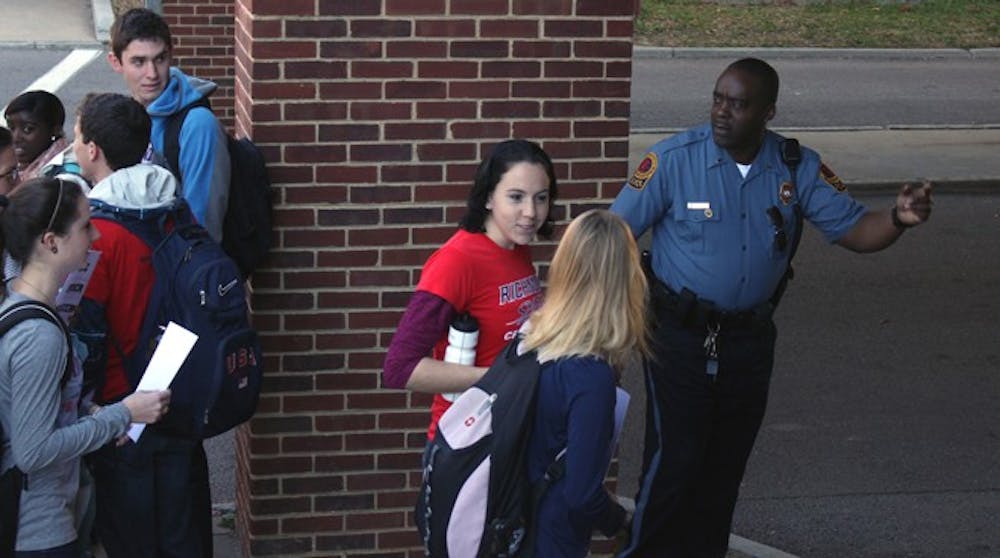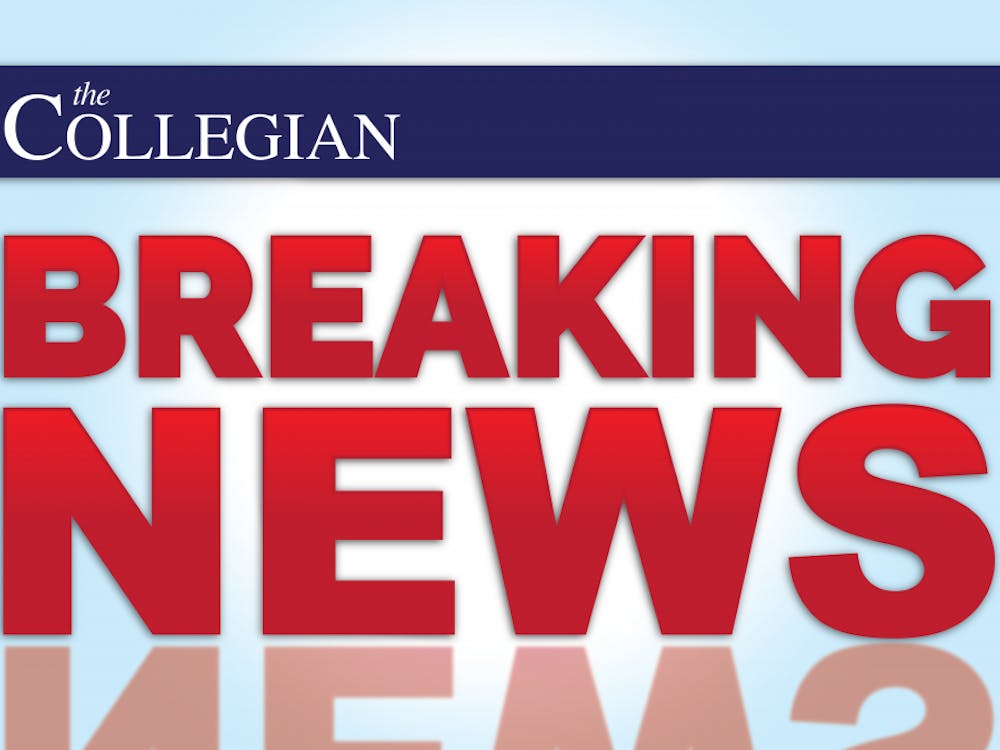A rally for sports teams transitioned into a call for transparency and communication in the aftermath of a student-led protest outside the December Board of Trustees meeting.
On Dec. 9, 2012, about 50 students assembled outside of the Tyler Haynes Commons for a peaceful protest concerning the reinstatement of the men's varsity track and field and soccer teams and the exclusion of student input in administrative decision-making.
Freshman Sen. Harry Lambert said that student government's involvement had developed from frustration with how administrative decision-making and communication had been handled throughout the fall semester.
Student government members felt that student rights had been infringed upon when students were not consulted in the decision that had affected so many of their peers, Lambert said. They put forth a resolution to work with the Board and the president so that students wouldn't feel disenfranchised, he said.
The students congregated outside of the Board subcommittee luncheon meetings because the time and place of all of the other official meetings were kept secret, said Kyle Ragan, a senior track and field runner.
"I feel it speaks very clearly to the transparency shown by Dr. Ayers and [rector of the board, Charles] Ledsinger and the rest of the administration," Ragan said. "They want to keep things as secret as they can."
Matt Groff, a sophomore track and field runner, said he understood that the University of Richmond was a private institution and that students didn't have to be told everything. If administration members want students to be transparent, they need to be doing the same, he said.
Student protesters tried to move up to the third floor of the Commons, but were denied access by university police officers, Ragan said. Jordan Chavez, a freshman track and field member, spoke to two police officers on the third floor of the Commons and asked the officers whether they would be arrested if the protesters stayed on the third floor.
"The police said they'd have to [arrest us] if we didn't leave," Chavez said. As an onlooker, Lambert said the atmosphere was tense, but that in the end, he was sympathetic with the officers' situation. It felt as if they were just following orders, he said.
Steve Bisese, vice president for student development, said that the confusion probably had been because protest policies were not 100 percent clear on campus. This lack of understanding called for students' first transparency concern, Groff said.
After being contacted by Richmond College President Evan Harris, Bisese cleared the student to go upstairs for a silent protest. Campus Police Chief Dave McCoy received a lot of feedback from faculty concerning the police actions at the protests. During break McCoy worked on plans to coordinate with student governments and faculty on future public safety issues, he said.
"You are not going to see what happened before happen again," McCoy said. Bisese invited McCoy to attend the next Presidents' Council meeting to prepare a presentation on school shootings and other public safety concerns to student leaders. McCoy also planned to work with the student governments to nominate a student representative as a point person for the police department.
Enjoy what you're reading?
Signup for our newsletter
When there is a controversial topic or movement on campus, this person may act as the communication connection between the police and the student community, McCoy said. Harris said he was looking forward to hearing more about this new position.
"The first semester was a reactionary period," Harris said. "Everyone was in a panic, thinking hopefully we could reverse a decision. When we saw that wasn't going to be the case, now we're going on the cool, calculated effort to decide how we can learn from this and how we can grow."
The sports supporters were unsure of what exactly unfolded in the board meeting, Ragan said. They only knew that Bobby Ukrop was supposed to make a presentation in favor of the teams' reinstatement, he said. When the decision was not brought to a vote, Ukrop resigned from the board of trustees, Ragan said.
"If you as the leader of the university have [Ukrop] as an ally and turn him into an enemy," Leadership professor Peter Kaufman said, "it says something about the quality of your leadership and the direction and good sense of the board."
Administrators have been using rhetoric to avoid direct answers, Groff said.
"It's funny because we're taught to recognize and see through that," he said. "They're talking to University of Richmond students." Track and field members were looking for an honest, straightforward conversation, Groff said.
McCoy said that there are many debatable topics in today's society, and that he expected more engagement and heated conversation from students on these issues. In reflecting on the December protest, McCoy said that the university should be an environment of free speech and debate.
Kaufman was not present at the student protest but said he believed that the initial denial to the student voice was symptomatic of the other less-visible forms of intimidation within the university.
"The atmosphere of fear, wariness about reprisals, etc., is not healthy for the kind of job we're doing," Kaufman said. "Faculty and students should be able to be critical of the administration without fear of reprisal and without preemptive prohibitions on discussion."
The job of a liberal arts institution is to give students as many sides to stories as seem plausible, Kaufman said, and to train students to use their critical intelligence presuming that faculty have the right the exercise their own.
Groff shared a similar view about a lack of communication with university leadership. "The one thing that has gotten me really irate through this whole matter is the fact that we can't get straight answers from them," Groff said. "Everything is so hush-hush at times. We aren't really acknowledged."
President Ayers was unavailable for an interview because of travel commitments, but wrote in an email response that the free expression of ideas is central to the university's educational purpose.
"I appreciate the work of Dr. Bisese and Chief McCoy in ensuring that students - and all members of the University community - have the opportunity to voice their opinions and assemble in peaceful protest," Ayers wrote.
Harris and Taylor Michals, the president of Westhampton College, are set to attend the February board of trustees meeting to show the student government's use on campus and connect administrative leaders with student leaders. The issue is that board members and student leaders are strangers to each other, Harris said.
"I'm hoping what I'm able to accomplish in this February meeting won't be for myself specifically," Harris said, "but it's going to be for three, four years down the road. They're going to say that that's when it changed. That's when student representation joined the board of trustees."
The student leadership has a variety of concerns, just like the faculty do, Kaufman said. He trusts that students will take action on this transparency issue if it becomes a real issue, he said. Lambert said that universities were one of the few places where you could learn and speak out safely, but that without student rallying it was hard to gauge student anger on this campus.
Contact staff reporter Kylie McKenna at kylie.mckenna@richmond.edu
Support independent student media
You can make a tax-deductible donation by clicking the button below, which takes you to our secure PayPal account. The page is set up to receive contributions in whatever amount you designate. We look forward to using the money we raise to further our mission of providing honest and accurate information to students, faculty, staff, alumni and others in the general public.
Donate Now



